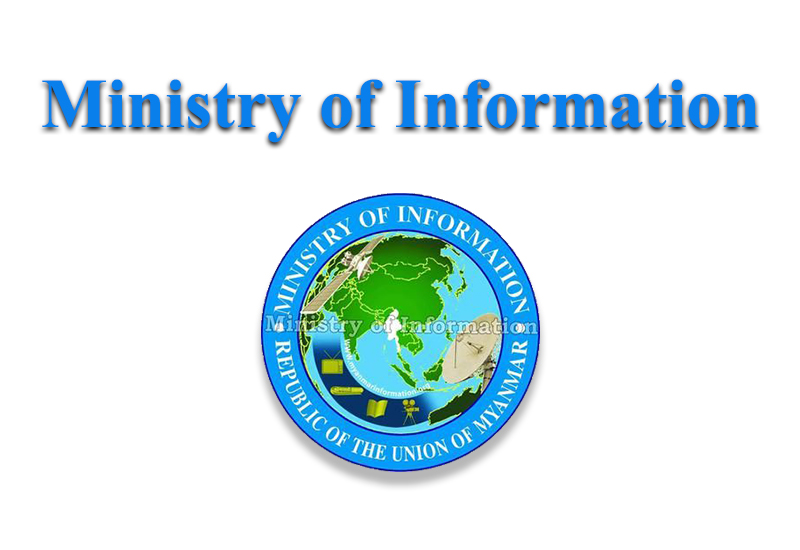To Eleventh Myanmar's Anti-Trafficking in Persons Day
13 September 2023
THE 13th of September has been marked as Anti-Trafficking in Persons Day of Myanmar since 2013 with the aim to combat trafficking in persons as a national responsibility and to encourage the participation of the entire nation. Today is the 11th Anniversary of Myanmar's Anti-Trafficking in Persons Day. Human trafficking is a humanitarian challenge that not only poses a serious threat to the human rights and dignity of individuals but also creates negative impacts on societies.
Human trafficking remains to be a serious violation of human rights, with traffickers taking advantage of those who are in difficult and vulnerable situations. Nowadays, countries around the world have recognized the problem of human trafficking as a form of transnational crime. Although efforts have been made to prevent trafficking in persons through various means, the cases of trafficking in persons are still increasing.
Myanmar has ratified the 2000 United Nations Convention against Transnational Organized Crime (UNCTOC) and its protocols; the Protocol to Prevent, Suppress and Punish Trafficking in Persons, Especially Women and Children; and the Protocol against the Smuggling of Migrants by Land, Sea and Air on 30 March 2004. Myanmar has also ratified the ASEAN Convention against Trafficking in Persons, Especially Women and Children (ACTIP) on 6 January 2017.
Moreover, the cooperative mechanisms of Myanmar on anti-trafficking persons have been enhanced by signing the Memorandum of Understanding on Cooperation against Trafficking in the Greater Mekong Sub-Region (COMMIT MoU) together with the countries in the Mekong region which includes Cambodia, China, Laos, Myanmar, Thailand and Viet Nam on 30 March 2004. Myanmar has also signed the bilateral MoUs on Anti-Trafficking in Persons with neighbouring countries such as China, Thailand, Laos and India. Myanmar has been actively participating in ASEAN Ministerial Meeting on Transnational Crime (AMMTC), Senior Officials Meeting on Transnational Crime (SOMTC), and Bali Process and Bay of Bengal Initiative on Multi-Sectoral Technical and Economic Cooperation (BIMSTEC) with the aim to combat transnational crimes including trafficking in persons.
With regard to the prevention, protection and prosecution of trafficking in persons, the Central Body for Suppression of Trafficking in Persons (CBTIP) has been taking the lead in developing and implementing the Five-year National Plans of Action with the participation of the relevant ministries. The 2023 Annual Work Plan under the Fourth Five-year National Plan of Action (2022-2026) has already been developed and the Work Plan is currently being implemented in harmony.
Every year, Myanmar nationals are being trafficked for forced labour, sexual exploitation, and forced marriage either in domestic or in neighbouring countries and other countries. The push factors for people to migrate legally or illegally to work in other countries include limited job opportunities with low income in the country. Consequently, the migrated workers are subjected to labour exploitation and sexual exploitation due to the inducements of the brokers or illegal migration to countries with no valid bilateral agreements on sending workers. Myanmar is currently facing the issues of forced labour associated with online fraud, and such cases involve citizens from other countries both in the form of perpetrators and victims. Thus efforts are being made to fight against these new phenomena.
Regarding the awareness-raising activities on anti-trafficking in persons and on the risks of human trafficking, preventive activities such as distributing pamphlets, erecting billboards and posters, conducting training and talks, broadcasting educational stories through multi-media, and putting stickers on the passenger buses and at the highway bus stations; and sending public information via SMS through telephone operators are being carried out.
In order to timely rescue the trafficked victims, 24-hour hotline phones are being operated in Nay Pyi Taw, Yangon, Mandalay and Muse, and timely identification of cases of trafficking in persons, taking actions and rescues are being carried out. In addition, sharing information and educating migrant workers and their families are also conducted through the opening of Migrant Resource Centres.
As protection measures, in accordance with “National Standard Operating Procedures on Return/Repatriation, Reintegration and Rehabilitation of Victims of Trafficking in Persons”, providing travel expenses, medical care and food for victims of trafficking, and supporting individual needs for rehabilitation are being implemented. Providing basic needs and physical and mental care, are also being performed while temporarily receiving the victims of trafficking in persons in the shelters in Myawaddy, Muse, Kawthoung, Mandalay and Yangon in cooperation with the relevant ministries.
The four sectors of the Fourth Five-year National Plan of Action (2022-2026) that is being implemented to fight against trafficking in persons, such as 23 activities in the Policy and Cooperation Sector; 16 activities in the Prevention Sector; 20 activities in the Prosecution Sector; 25 activities in the Protection Sector must be implemented effectively and successfully in a balanced manner.
Nowadays, in line with the theme of the 11th Myanmar’s Anti-Trafficking in Persons Day (2023), which is “Reach every victim of trafficking, leave no one behind”, it is believed that trafficking in persons can be reduced and controlled by victim-centred investigation, identification of victims of trafficking in persons, and providing full protection for the victims of trafficking in persons.
#TheGlobalNewLightOfMyanmar

